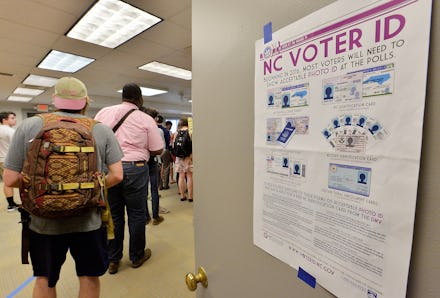North Carolina Couple Says They Were Forced to Spell Their Names When They Tried to Vote

When Rudy Ravindra went to cast his vote in the North Carolina primaries earlier this month, he was forced to spell his name out loud while a poll worker hid his ID from view, a process that Ravindra described as "humiliating." When he accompanied his wife while she voted at a different polling place, she was made to do the same thing in order to prove she was who she said.
Read: One Chart Shows the Depressingly Racist Truth About Voter ID Laws You Tried to Ignore
At each polling place, Ravindra didn't see anyone else subjected to the same spelling test — and he thinks he knows why the two of them were singled-out. "That in a sea of white faces at both polling stations my wife and I were the only brown-skinned individuals ... led us to suspect that we were victims of racial prejudice," Ravindra wrote in a op-ed published in the News and Observer last week.
In his op-ed, titled "My brush with North Carolina voter ID law," Ravindra described the "ordeal" of being forced to spell out his full, legal name, Rudravajhala Ravindra, before he could cast his vote, as the poll worker who had asked him to do it slowly typed each letter. "each time he made a mistake, I patiently corrected," Ravindra wrote. "Meanwhile, voters in adjacent lines came and went briskly."
Ravindra's wife was asked to do the same, but, as far as Ravindra could tell, none of their white friends were made to spell their names aloud to prove they were who they said they were. "Our two Caucasian friends who live in different areas of town voted at different polling places. In contrast to our humiliating experience, however, they did not have to pass the spelling test and after a cursory glance at their IDs were allowed to vote."
North Carolina's voter identification law, which requires voters to show a form of "acceptable photo ID" at the polls, has been criticized by many as unfairly discriminating against people of color, who may be less likely to have any of the necessary forms of identification. Defenders of the ID requirement say that it protects against voter fraud, despite the fact that such fraud is incredibly rare.
"The real motivation [behind the law] is to make it harder for those likely to vote Democrat to vote," Richard Hasen, a professor of law and political science at the University of California at Irvine, told the Los Angeles Times in February, speaking about North Carolina's voter ID law.
After his voting experience, Ravindra said that he reached out to the director of the New Hanover County Board of Elections, who apparently apologized. "He said that the poll workers overstepped their authority and that they had no reason to subject us to that unnecessary exercise," Ravindra wrote. "He said poll workers only have to look at a photo ID to ascertain the bonafide of a voter. He apologized profusely."
Whether Ravindra was targeted for the color of his skin or just made to jump through extra hoops for shallow reasons, he couldn't help but feel there was extra tension surrounding this election season. "In these days of Trumpism and shameless xenophobia and other assorted phobias, we can't be blamed if we are paranoid," Ravindra wrote.